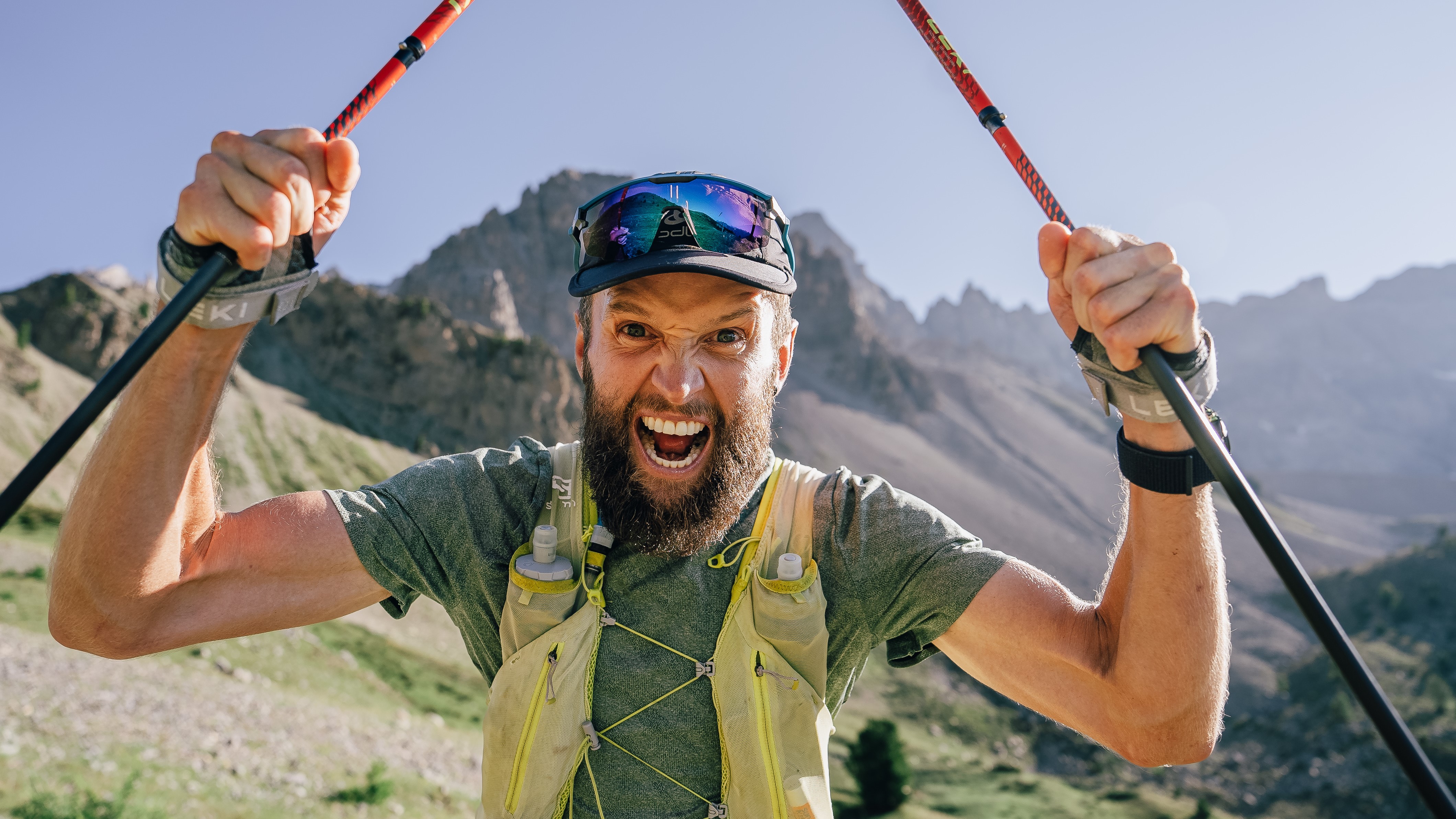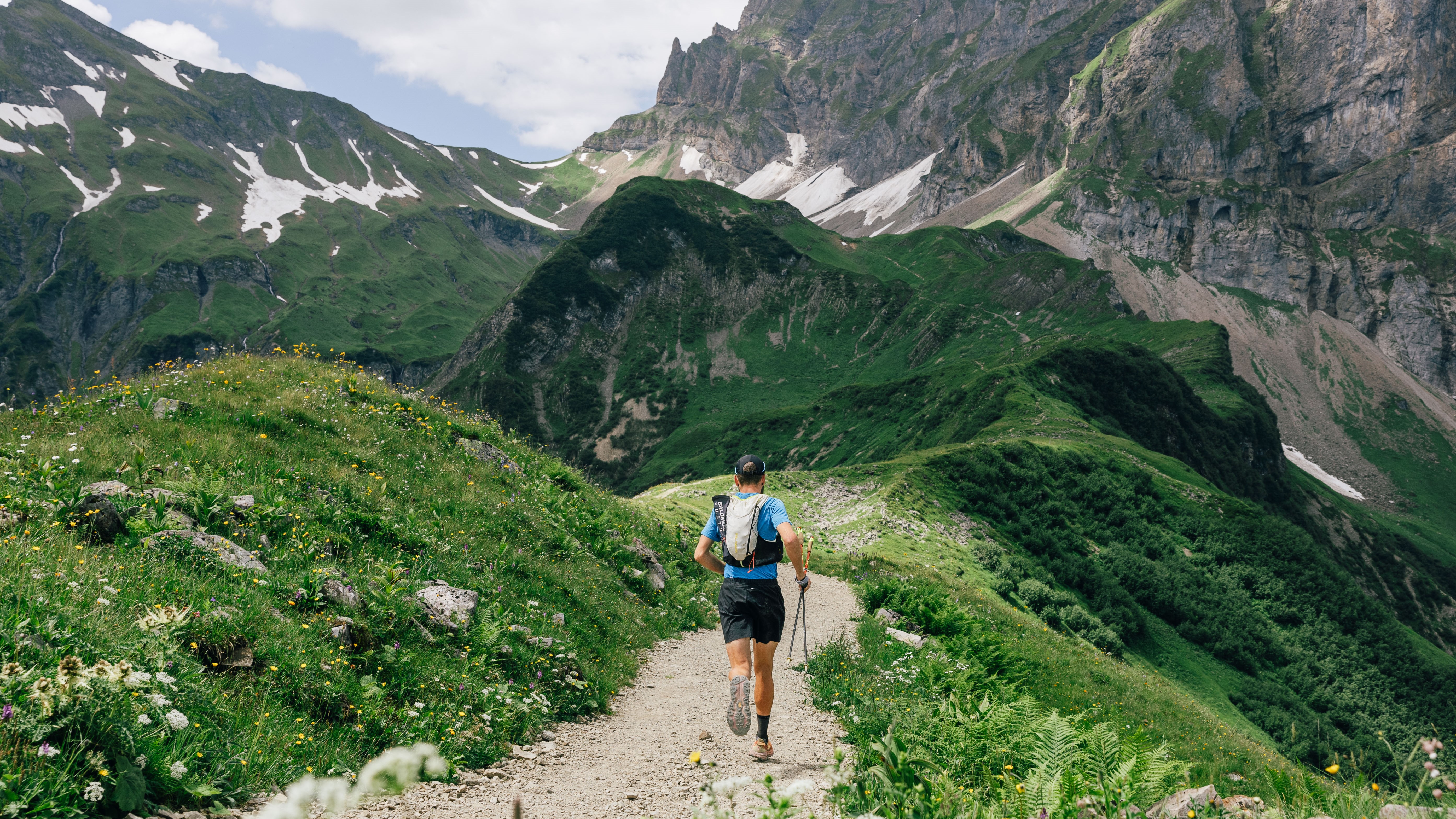Pain, danger and a lot of chocolate milk – Jake Catterall on how he ran across the Alps (and 5 lessons learned on the way)
We chat to Jack Catterall about what learned on his 2,000 km run

All the latest inspiration, tips and guides to help you plan your next Advnture!
You are now subscribed
Your newsletter sign-up was successful
Jake Catterall’s record-setting race across the Alps this summer started with a joke his mom made at the dinner table. Having already run the 5,000 km from northern Norway to southern Spain in 2023, she lightheartedly suggested he might as well run across all the mountains in Europe. He thought it was a good idea.
Now the British runner has gone from racing 5ks in under 16 minutes to being the first person to run the 2,000 km Via Alpina red route through Italy, Slovenia, Austria, Germany, Switzerland, France and Monaco.
Sure, he figured out the best trail running shoes for success (it's the Hoka Speedgoat 6 if you're curious) and he credits his Garmin Enduro 2 with saving him time on navigation, but we wanted to know what the special sauce was that powered him through the 35-day adventure so we sat down to find out how he did it, and what he learned along the way.
1. Your body knows what’s coming
No one would be surprised if running the equivalent of Everest 12 and a half times over the course of a month brought about a few weird side effects, but Catterall says thanks to his training and preparation, there were no nasty surprises. And that, he thinks, is down to training and preparation.
“I spent the best part of nine months telling my body, ‘for 35 days you’re going to go through hell and there isn’t going to be an option to sit and rest and take a break afterward. You’re going to have to wake up at seven in the morning and get back on the horse at 8:30 a.m. and do it all over again.’”
Using a progressive overload approach to training, he started out with a moderate load and slowly increased the intensity of his workouts by only about two percent each week, so by the time he arrived in Italy nine months later, he says, his body was able to predict what was coming and recover faster.

2. It’s fun being a bit weird
Catterall hails from Leicester in England but lives in Amsterdam, which if you don’t know, is pretty flat.
All the latest inspiration, tips and guides to help you plan your next Advnture!
“It’s probably the worst place you could be to train for something like this.”
Making do with what he had available, he says he did the bulk of his training running on the roads around Amsterdam and a lot of climbing on the Stairmaster.
“There were a lot of very chic, pretty boys and girls in the gym trying to get their booty looking good and then I was just a mess, completely soaked in sweat, carrying this huge military backpack on the Stairmaster.
We’re not talking 10 minutes on the Stairmaster here. Catterall worked his way up to two-hour sessions of climbing the stairs to nowhere while carrying a 16 kilogram backpack to prepare his muscles and ligaments for what was coming. Was he self-conscious? Not much.
“You just have to embrace the fact that you’re going to look a bit weird.”
3. There's pain and then there's pain
Ultra running equals pain, but Catterall has learned that managing pain comes down to deciphering between the type that you can’t push through ("pain that hurts") and pain that you can live with.
The latter he calls “pain that alters” and that’s the stuff you just have to suck up and keep going through.
“If it’s not killing you, you can still go on,” he laughs.
In the Alps, any pain and swelling that he experienced seemed to resolve itself, and he kept putting one foot in front of the other.

4. A bit of danger is good for you
Hiking and trail running in alpine environments is an inherently risky thing to do, and as far as Catterall is concerned, that’s exactly the point.
“We spend lots of time worrying about things we don’t need to worry about.”
“Putting yourself out into stressful environments where you’re completely alone for hours and if you roll your ankle you’re going to have to crawl off the mountain is quite good for people nowadays. It helps us to level out what we consider to be bad in our lives.”
Spending time in true survival mode – though he admits that help was always just an SOS call away – teaches him to deal with stress and fear in a controlled environment, and that can be useful off the trail as well as on.
“Adulting is quite difficult, so you’re better off preparing yourself in a good way and doing stuff like this to help you manage your own day-to-day life.”

5. Chocolate milk is super fuel
With so much focus on fueling for athletes these days, you might be expecting to hear that Catterall’s nutrition plan required a precise approach to running gels and salt tablets. In truth, his biggest priority was getting as many calories as possible without getting bogged down in the details.
Catterall only weighs about 145 lbs which made getting the requisite 4,000 calories a day even more of a challenge, especially since he’d learned from his previous adventure that liquids work best.
Fortunately, there’s chocolate milk.
“That was my big calorie bomb," he says and he means it – at the end of the month he’d consumed an impressive 40 liters of the stuff.
Beyond that, he describes his nutrition plan as “a mixture between an Italian restaurant and a kids' party” packed with pasta and constant sour, sugary snacks. Add to that a lot of Cokes (five or six a day) and Red Bulls to keep his energy levels up and somehow after 35 days and 2,000 km, he had only lost around 6.5 lbs.
Julia Clarke is a staff writer for Advnture.com and the author of the book Restorative Yoga for Beginners. She loves to explore mountains on foot, bike, skis and belay and then recover on the the yoga mat. Julia graduated with a degree in journalism in 2004 and spent eight years working as a radio presenter in Kansas City, Vermont, Boston and New York City before discovering the joys of the Rocky Mountains. She then detoured west to Colorado and enjoyed 11 years teaching yoga in Vail before returning to her hometown of Glasgow, Scotland in 2020 to focus on family and writing.

